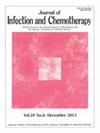香港社区居民对抗生素使用和抗菌素耐药性的认识、认知和行为。
IF 1.9
4区 医学
Q3 INFECTIOUS DISEASES
引用次数: 0
摘要
背景:了解公众对抗生素和抗菌素耐药性(AMR)的认识和行为,可为减少抗生素不当使用的干预措施提供依据:了解公众对抗生素和抗菌素耐药性(AMR)的相关知识和行为,有助于采取干预措施,减少抗生素的不当使用:我们在 2020 年至 2022 年期间对香港社区居住的成年人进行了一次问卷调查,以了解他们对 AMR 和抗生素的知识、风险认知以及抗生素使用的行为模式。通过回归模型研究了人口统计学、社会经济地位和总体健康状况等信息与知识得分、抗生素使用行为和对无抗生素食品的偏好之间的关系:在 1147 名参与者中,AMR 和抗生素知识得分的中位数为 13 分(四分位距(IQR):9-17 分,满分 24 分)。女性(知识系数:-0.95;95% 置信区间(CI):-1.65,-0.26)和年龄≥65 岁者(-1.91;-2.85,-0.98)的得分相对较低。超过 94% 的抗生素使用者表示严格遵守处方,而大多数不遵守处方的使用者则保留未使用的抗生素以备将来使用(45/66,68.2%)。慢性病的存在与过去一年中抗生素的使用有关(几率比(OR):1.65;95% CI:1.20,2.29)。社会经济地位或知识得分越高,对无抗生素食品的认识和偏好就越高,对AMR相关威胁的信念就越强,而年龄越大,对无抗生素食品的认识和AMR风险的感知就越低:AMR相关知识的缺乏和潜在的抗生素暴露,尤其是在年龄较大、受教育程度较低、社会经济地位较低的人群中,凸显了在公众中加强有针对性的AMR教育和风险交流的必要性。本文章由计算机程序翻译,如有差异,请以英文原文为准。
Knowledge, perception, and behaviours related to antibiotic use and antimicrobial resistance in community-dwelling individuals in Hong Kong
Background
Understanding public knowledge and behaviours related to antibiotics and antimicrobial resistance (AMR) may inform interventions to reduce inappropriate antibiotics use.
Methods
We conducted a questionnaire survey in community-dwelling adults in Hong Kong from 2020 to 2022 to examine knowledge, risk perception on AMR and antibiotics, and behavioural patterns in antibiotic use. Information on demographics, socioeconomic status and general health was examined in relation to the knowledge score, antibiotic use behaviours and preference for antibiotic-free food products in regression models.
Results
Of the 1147 participants, the median knowledge score on AMR and antibiotics was 13 (interquartile range (IQR): 9–17 out of 24). Females (knowledge coefficient: −0.95; 95 % confidence interval (CI): −1.65, −0.26) and those aged ≥65 years (−1.91; −2.85, −0.98) had a relatively lower score. Over 94 % of antibiotic users reported strict adherence to prescriptions, while most non-compliant users kept unused antibiotics for future use (45/66, 68.2 %). Presence of chronic diseases was associated with antibiotic use in the past year (odds ratio (OR): 1.65; 95 % CI: 1.20, 2.29). A higher socioeconomic status or knowledge score predicted a better awareness of and preference for antibiotic-free food and stronger belief in AMR-related threats while older age was associated with lower awareness of antibiotic-free food and perceived risk of AMR.
Conclusions
The lack of AMR-related knowledge and potentially higher antibiotics exposure, particularly in older, less educated, socioeconomically underprivileged individuals, highlighted the need for improving targeted education and risk communication on AMR in the public.
求助全文
通过发布文献求助,成功后即可免费获取论文全文。
去求助
来源期刊

Journal of Infection and Chemotherapy
INFECTIOUS DISEASES-PHARMACOLOGY & PHARMACY
CiteScore
4.10
自引率
4.50%
发文量
303
审稿时长
47 days
期刊介绍:
The Journal of Infection and Chemotherapy (JIC) — official journal of the Japanese Society of Chemotherapy and The Japanese Association for Infectious Diseases — welcomes original papers, laboratory or clinical, as well as case reports, notes, committee reports, surveillance and guidelines from all parts of the world on all aspects of chemotherapy, covering the pathogenesis, diagnosis, treatment, and control of infection, including treatment with anticancer drugs. Experimental studies on animal models and pharmacokinetics, and reports on epidemiology and clinical trials are particularly welcome.
 求助内容:
求助内容: 应助结果提醒方式:
应助结果提醒方式:


